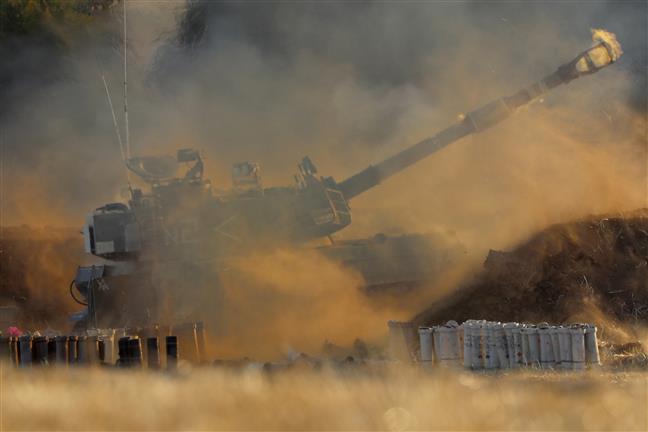
GAZA: Israel fired artillery and mounted more air strikes on Friday (May 14) against Palestinian militants in the Gaza Strip amid constant rocket fire deep into Israel’s commercial centre.
As hostilities entered their fifth day, with no sign of abating, the Israeli military said in a statement shortly after midnight that air and ground forces were attacking the Hamas-run enclave. This was confirmed by the army’s spokesperson.
But two hours later the army published a clarification saying there were “no soldiers” in Gaza, blaming an “internal communication” problem for the confusion.
Rocket barrages from Gaza swiftly followed.
Israeli military affairs correspondents who are briefed regularly by the armed forces also said it was not a ground invasion, and that troops were firing artillery from Israel’s side of the border.
Residents of northern Gaza, near the Israeli frontier, said they had seen no sign of Israeli ground forces inside the enclave but reported heavy artillery fire and dozens of air strikes.
Israeli Prime Minister Benjamin Netanyahu said on Thursday the campaign “will take more time”. Israeli officials said Hamas, Gaza’s most powerful militant group, must be dealt a strong deterring blow before any ceasefire.
The sound of explosions echoed across northern and eastern parts of Gaza. Witnesses said many families living in areas near the border quit their homes, some seeking shelter at United Nations-run schools.
Violence also spread to mixed communities of Jews and Arabs in Israel, a new front in the long conflict. Synagogues were attacked and fighting broke out on the streets of some towns, prompting Israel’s president to warn of civil war.
At least 109 people were killed in Gaza, including 29 children, over the previous four days, Palestinian medical officials said. On Thursday alone, 52 Palestinians were killed in the enclave, the highest single-day figure since Monday.
Seven people were killed in Israel: A soldier patrolling the Gaza border, five Israeli civilians, including two children, and an Indian worker, Israeli authorities said.
UN MEETING DELAYED
Worried that the region’s worst hostilities in years could spiral out of control, the United States was sending in an envoy, Hady Amr.
Truce efforts by Egypt, Qatar and the United Nations had yet to deliver a sign of progress.
The UN Security Council will hold a virtual public meeting on Sunday to address the soaring violence, diplomats said on Thursday.
The United States, which had blocked an originally scheduled Friday session and proposed a meeting early next week, agreed to move the session – requested by Tunisia, Norway and China – to Sunday, the same sources said.
The US said earlier on Thursday it wanted to give time for diplomacy.
US President Joe Biden called on Thursday for a de-escalation of the violence, saying he wanted to see a significant reduction in rocket attacks.
“PREVENTING POGROMS”
Militants fired rocket salvoes at Tel Aviv and surrounding towns on Thursday, with the Iron Dome anti-missile system intercepting many of them. Communities near the Gaza border and the southern desert city of Beersheba were also targeted.
Five Israelis were wounded by a rocket that hit a building near Tel Aviv on Thursday.
Netanyahu said Israel has struck a total of close to 1,000 militant targets in the territory.
The heavy bombardments coincided with the start of Eid al-Fitr, which marks the end of the Muslim holy fasting month of Ramadan, and saw the faithful pray at mosques and amid the rubble of Gaza’s collapsed buildings.
Three rockets were also fired from southern Lebanon towards Israel, landing in the Mediterranean Sea, Israel’s army said.
A source close to Israel’s arch-enemy Hezbollah said the Lebanese Shia group had no link to the incident.
The military escalation was triggered by weekend unrest at Jerusalem’s Al-Aqsa mosque compound, which is sacred to both Muslims and Jews.
The disturbances, in which riot police had repeatedly clashed with Palestinians, has been driven by anger over the looming evictions of Palestinian families from the Sheikh Jarrah neighbourhood of east Jerusalem.
The surging tensions sparked clashes in many of Israel’s mixed towns where Jews live alongside Arabs, who make up about 20 per cent of the country’s population.
Nearly 1,000 border police were called in to quell the violence, and more than 400 people were arrested.
Israeli police spokesman Micky Rosenfeld said inter-communal violence in multiple towns was at a nadir not seen for decades, and that police were “literally preventing pogroms”.
“TWO-FRONT BATTLE”
Prime Minister Benjamin Netanyahu said police were increasing their use of force, warning of the “option” of deploying soldiers in towns.
Israeli far-right groups have clashed with security forces and Arab Israelis, with television footage Wednesday airing footage of a far-right mob beating a man they considered an Arab in Bat Yam, near Tel Aviv, leaving him with serious injuries.
In Lod, which has become a flashpoint of Arab-Jewish clashes this week with an Arab resident shot dead and a synagogue torched, a gunman opened fire Thursday at a group of Jews, wounding one.
Netanyahu said the violence was “unacceptable”.
“Nothing justifies the lynching of Arabs by Jews, and nothing justifies the lynching of Jews by Arabs,” he said, adding Israel was fighting a battle “on two fronts”.
Amid the rocket fire, Israel’s civil aviation authority said it had diverted all incoming passenger flights headed for Tel Aviv’s Ben Gurion airport to Ramon airport in the south.
Hamas announced it had also fired a rocket at Ramon, in a bid to stop all air traffic to Israel.
Israeli media said the rocket missed its target, but a number of international airlines cancelled flights amid the aerial onslaught.


